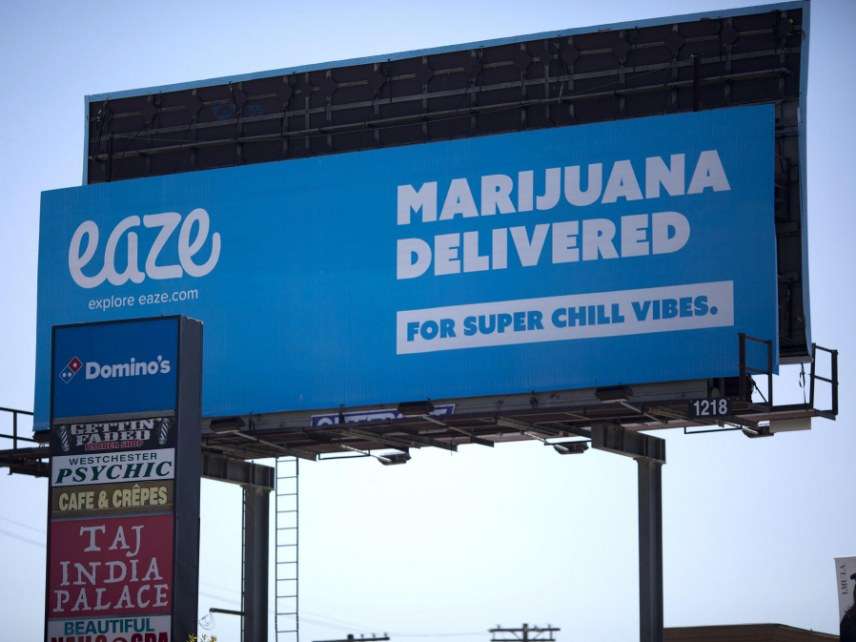California Doesn't Need More Marijuana Regulation; It Needs Less
Governor Newsom wants to fight the black market. That's how we got the drug war in the first place.

California thought it was going to make billions in revenue from marijuana sales once it was legal for recreational use in the state. That hasn't happened. California has piled so many taxes onto the industry and so many cities have banned shops that the state actually lost revenue when compared to previous medical marijuana sales.
This doesn't necessarily mean people are smoking less. Rather, the exorbitant costs to legally sell marijuana in California has perpetuated the black market that legalization was supposed to eliminate.
Some lawmakers recognize the problem and have proposed cutting state taxes to make it more reasonable for people to be able to legally deal marijuana at a competitive price. Unfortunately, Gov. Gavin Newsom's administration, in a new report, sees the continued flourishing of the black market as an "enforcement" problem. The state is not doing enough to crack down on unlicensed marijuana grow operations. From the Los Angeles Times:
Newsom said recently that he would address the black market with a carrot-and-stick approach that would "move expeditiously at licensing more and more dispensaries" while also "making sure we go after the bad actors."
"I want to see more enforcement," Newsom told reporters two days after the critical advisory committee report was released.
As much as 80% of the marijuana sold in California comes from the black market, according to an estimate by New Frontier Data, a firm that tracks cannabis sales and trends. Analysts also found that California's illicit pot market was valued at an estimated $3.7 billion last year, more than four times the size of the legal market.
Enforcement by the state has been hampered by a lack of resources, a decision to give new firms ample time to comply with complex regulations and political disputes, according to state records and interviews with officials and industry insiders.
There's a problem here highlighted in that last paragraph—the idea that this decision to give firm times to comply is some sort of kindness being directed toward marijuana entrepreneurs. The reality of the situation was highlighted in starker terms on Sunday in the pages of the very same newspaper. The biggest barrier for some people trying to legally sell marijuana isn't just the high taxes they have to account for. They're finding that after all this lead up, city governments still aren't really prepared on their end to license the shops. In Los Angeles, many wannabe legal marijuana vendors tried to follow the proper permitting process only to get burned by an unprepared bureaucracy.
After giving special preference to shops that had been already operating or providing marijuana for medical dispensaries, the city was supposed to throw open the doors for newcomers. That hasn't happened. And Los Angeles leaders don't know when it will. From the Los Angeles Times:
"They just keep saying, 'We don't know,'" said Benjamin Brayfield, who shut down his cannabis collective more than a year ago, trying to stay in line with the law while L.A. started its licensing process. In January, he abandoned his Mid-Wilshire location and has been working with a company in Palm Springs instead.
This month, the department said it hopes to begin the last phase of local licensing this spring or summer. At a meeting on Friday, both City Council President Herb Wesson and Cat Packer, executive director of the Department of Cannabis Regulation, said L.A. needs to proceed thoughtfully, not rush.
"People wanted their licenses yesterday," Packer acknowledged. "But the truth of the matter is that we are just getting started."
That they're saying they're "just getting started" more than a full year after California legalized recreational sales is indicative of a serious problem with the city government's ability to adequately administer a program it demands authority over.
Black markets, of course, exist whenever people cannot legally purchase the goods and services that they're looking for at a reasonable cost. The high taxes in California have guaranteed that a black market is likely to continue. But let's also not discount that bureaucratic incompetence is also making it impossible for the market to legally meet consumer demand. People are essentially having their lives disrupted and are facing economic hardships all because they tried to "follow the rules."
That Newsom is insisting on harsh penalties for rule-breakers shows how little he truly understands why it was important to legalize marijuana in the first place. The criminalization of marijuana and the drug war that ensued disrupted and ruined countless lives for perpetuating a manufactured public safety scare. The enforcement of marijuana laws were what created the black market. To get rid of the laws, but then put into place an equally repressive system that ends up punishing people and still creates an environment where a black market is in demand just misses the entire point. It's the inability to legally purchase marijuana that created the black market. Fix that problem.
More from ReasonTV on California's continued marijuana black market:


Show Comments (27)